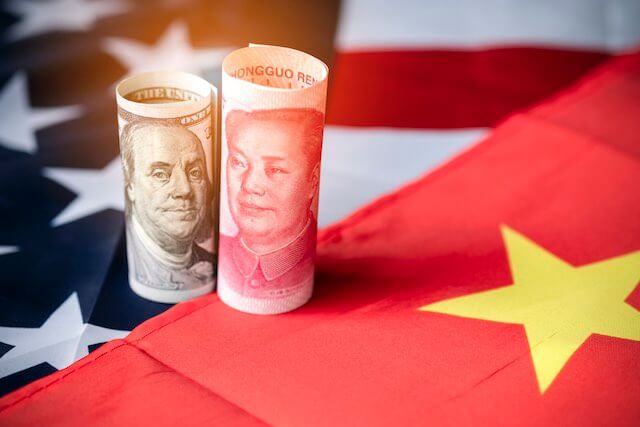Will the Federal Retirement Thrift Investment Board (FRTIB) move out on implementing the new mutual fund window? Not if some Senators have their way.
Six Senators have sent a letter to the Acting Chairman of the Federal Retirement Thrift Investment Board (FRTIB) regarding the upcoming release of the new TSP mutual fund window. The Senators are asking that the FRTIB “immediately cease its plans to offer the proposed Mutual Fund Window”. The full text of the letter is included below as well.
The TSP mutual fund window will allow investing in up to 25 percent of the investments in one or more of some 5,000 mutual fund options.
The letter states:
[I]t is unlikely that your Board would be able to ensure that the approximately 5,000 mutual funds are all free of Chinese firms that pose a direct threat to American national security, enterprises implicated in Chinese Communist Party (CCP) human rights abuses, or companies that otherwise lack the requisite financial transparency and fiduciary responsibility to qualify as prudent investment opportunities.
According to the Senators’ letter and minutes from the FRTIB, the FRTIB has acknowledged it will not be able to monitor investments of the 5,000 or so funds for any investments in Chinese entities as the effort “would prove too costly for the plan”.
FRTIB Philosophy on Chinese Investments
In November 2019, Michael Kennedy, the FRTIB Chairman at the time, wrote:
TSP funds are solely the property of plan participants—it is not federal money and it is not taxpayer money. Choices on how to invest in the TSP funds belong solely to the participants. The FRTIB is required by Congress to make decisions that are in the best interest of all TSP participants, and not consider issues better left to other federal entities.
In other words, the Board took the position that adding Chinese companies into the I Fund was in the best interests of TSP investors.
The dispute reached the White House, and President Trump issued his opinion on the issue and was described as “incredulous” over the prospect of the TSP going forward with a planned change to its international stock fund (I Fund).
The FRTIB then backed away from proposed changes to the I Fund.
Latest on Dispute Over Chinese Investments
Numerous attempts have been made to dissuade the FRTIB fr0m using TSP investments for investing in Chinese companies. The argument is summed up in the letter included in a press release from Senator Marco Rubio (R-FL):
U.S. service-members and other federal employees would likely be shocked to learn that the FRTIB is unaware of which companies make up these approved funds or what risk those companies pose. They do not want their retirement dollars to underwrite the development of the CCP’s advanced weapons systems and military modernization. They do not want to be implicated in sponsoring genocide of the Uyghur people, equipping concentration camps, and trafficking in forced labor. They do not want to invest in an opaque mutual fund platform in which Chinese companies do not adhere to federal securities laws or submit to adequate disclosure requirements. When they invest through TSP, they rightly expect the FRTIB will protect them and their investments from these types of dangerous investments.
While the FRTIB backed down under the Trump administration from adding more Chinese investments, at the time the statement that was issued was that the Board was “delay(ing) the implementation of the I Fund benchmark change….”
As implied by the statement, the FRTIB is now going ahead with the plans to invest in more Chinese companies including some, according to Senator Rubio, “currently sanctioned by the U.S. government for human rights abuses or otherwise blacklisted for the threat they pose to U.S. national security.” The Senator’s comments refer to the mutual fund window and not to the TSP core funds.
At the latest meeting of the FRTIB, there was no indication of any delay in implementing the TSP mutual fund window or any discussion of any possible delay in the implementation date.
Whether Senator Rubio’s contention that “U.S. service-members and other federal employees would likely be shocked to learn that the FRTIB is unaware of which companies make up these approved funds or what risk those companies pose” is accurate or not remains to be seen. In fact, it is doubtful most TSP investors are aware of the dispute or the arguments about why investing in these companies may pose a danger to their investment portfolios.
Senators Letter to FRTIB Regarding National Security Concerns With Upcoming TSP Mutual Fund Window
Dear Acting Chairman Jones:
We write to convey urgent concern with regard to the Federal Retirement Thrift Investment Board’s (FRTIB) decision to open a new “Mutual Fund Window” beginning next month for federal Thrift Savings Plan (TSP) participants. Such a move could expose billions of dollars in retirement savings of U.S. federal employees and service-members to Chinese companies, including ones currently sanctioned by the U.S. government for human rights abuses or otherwise blacklisted for the threat they pose to U.S. national security.
The FRTIB previously considered taking similar actions to invest federal retirement savings in dangerous, unaccountable Chinese firms, including tracking the TSP’s International Stock Index Investment (I Fund) to the MSCI All Country World ex-U.S. Investable Market Index (ACWI ex-US IMI). This would have meant investing the pensions of TSP account-holders in some of Beijing’s most odious military contractors as well as Chinese surveillance technology companies such as Hikvision, which the Biden Administration is reportedly considering sanctioning as part of its Specially Designated Nationals and Blocked Persons List.
After widespread and bipartisan outrage in 2020, the FRTIB voted unanimously to abandon the ACWI ex-US IMI transition. We urge the Board not to follow through with this ill-advised move. In that same spirit, we ask the FRTIB to immediately cease its plans to offer the proposed Mutual Fund Window, which would provide TSP account-holders the option to invest up to 25 percent of their savings in one or more of approximately 5,000 mutual funds. Given the vast number of Chinese companies implicated in this decision and the FRTIB’s past efforts to include such companies in the TSP, it is unlikely that your Board would be able to ensure that the approximately 5,000 mutual funds are all free of Chinese firms that pose a direct threat to American national security, enterprises implicated in Chinese Communist Party (CCP) human rights abuses, or companies that otherwise lack the requisite financial transparency and fiduciary responsibility to qualify as prudent investment opportunities. In fact, the FRTIB has explicitly acknowledged as much, when it noted last year that “monitoring approximately 5,000 mutual funds for any investments in Chinese entities would prove too costly for the plan.”
U.S. service-members and other federal employees would likely be shocked to learn that the FRTIB is unaware of which companies make up these approved funds or what risk those companies pose. They do not want their retirement dollars to underwrite the development of the CCP’s advanced weapons systems and military modernization. They do not want to be implicated in sponsoring genocide of the Uyghur people, equipping concentration camps, and trafficking in forced labor. They do not want to invest in an opaque mutual fund platform in which Chinese companies do not adhere to federal securities laws or submit to adequate disclosure requirements. When they invest through TSP, they rightly expect the FRTIB will protect them and their investments from these types of dangerous investments. It is evident that the FRTIB cannot live up to that expectation at this time. For these, and several other reasons, we again urge the Board to cancel, or, at minimum, postpone implementation of its Mutual Fund Window initiative until your Board can ensure that no TSP funds are invested in dangerous, non-compliant or opaque Chinese securities, as well as commit to providing TSP account-holders as much transparency as possible about where their hard-earned savings are being invested.
We appreciate your attention to this urgent matter and look forward to your timely response.





